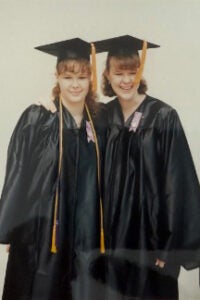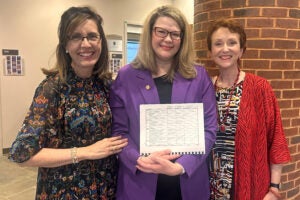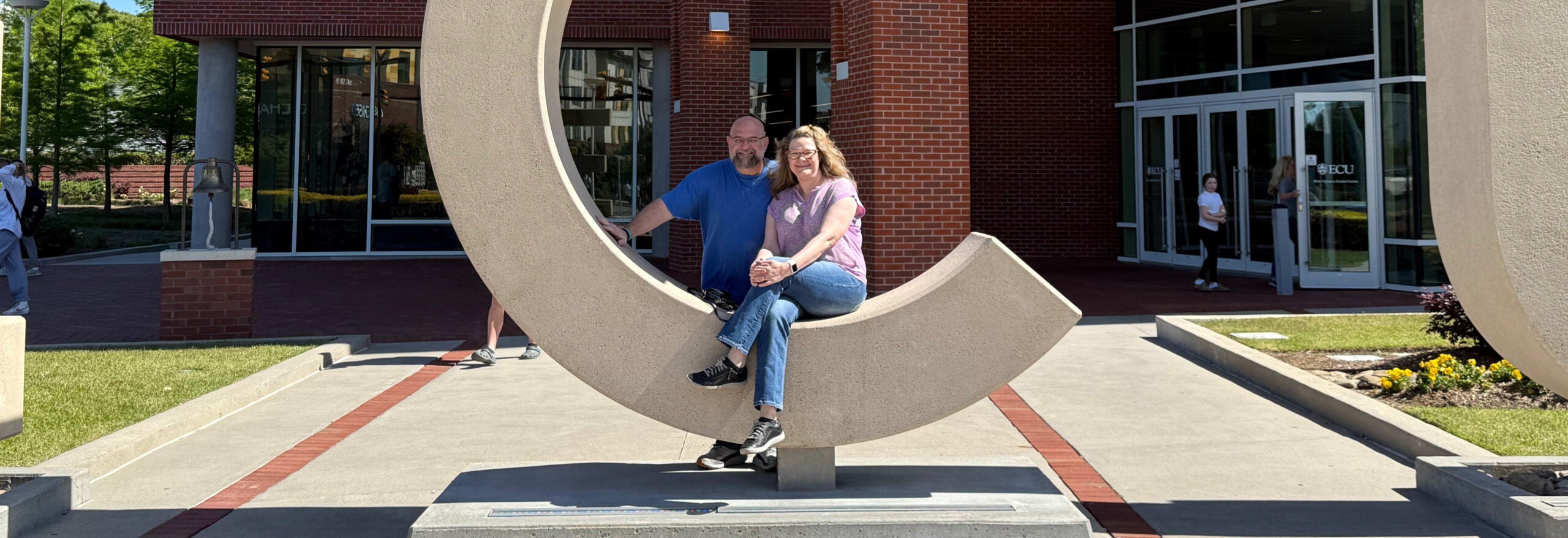Pirate nurse leads high-tech neonatal pain research
A Pirate nurse has traveled far from her North Carolina home to learn the skills needed to relieve the pain felt by the smallest patients entrusted to a nurse’s care.
Dr. Katherine Dudding, a 1997 graduate of East Carolina University’s College of Nursing, is combining high-tech machine learning and artificial intelligence with her decades of neonatal experience to better understand the ways that premature infants experience pain — with the goal of making the transition to life as pain-free as possible.
Dudding and her twin sister Chrissy were raised in a military family, living mostly at Pope Air Force Base in Goldsboro, but also traveling the world. They lived in Hawaii and

Kathy and her twin sister, Chrissy, pose during their graduation from ECU. (Contributed photo)
Panama, and when time for college rolled around, they returned to North Carolina to start their nursing education.
“It was a lot of fun; we were in the same dorm at Tyler Hall,” Dudding said. “I always had a great study partner.”
After graduation from ECU, Kathy and Chrissy married a pair of best friends from high school. Chrissy moved to Germany with her Army officer husband weeks after graduating and Kathy stayed close, working at then Pitt County Memorial Hospital in the neonatal intermediate unit.
Dudding’s new husband’s job working for the federal government soon transplanted her to Tucson, where she continued to work with the most vulnerable patients in the neonatal intensive care unit. After several years of working as a nurse, precepting student nurses, and serving as a clinical leader and unit educator, she started to feel a pull to do something more. The connections she had with nursing school instructors started to open doors and she also reached back to Dr. Linda Bolin, one of her undergraduate faculty members at ECU, for advice.
“I wanted to do something in informatics, and I was set up with an advisor who would soon become my chair, Dr. Jane Carrington. After 2 1/2 hours, I was like, ‘Sign me up, I’m getting a Ph.D.,’” Dudding said.
It was nearly two decades since Dudding had been in the classroom, and online learning presented a steep learning curve. Thankfully she was able to be in person — in classrooms — for the artificial intelligence and machine learning coursework but she “definitely felt way too old to come back to school — it was an adjustment,” she said.
The University of Arizona had a BSN to Ph.D. program that took her 3 1/2 years to complete. When she completed the program, she walked across the stage with her doctoral degree and a minor in cognitive science, focusing on artificial intelligence and machine learning.
Combining Science with Care
Dudding intended to use her expertise with neonates, combined with her new immersion into the world of information science, to explore pain in premature infants who have very limited ways of showing discomfort. She graduated in 2018 and soon moved to teach nursing informatics and conduct her research at the University of Alabama, first in Birmingham and then Tuscaloosa.
“Pain in neonates has only been acknowledged since 1987; there’s still a lot that we need to learn about it and premature infants. They don’t show pain like you and I do — it’s very subtle,” Dudding said.

Dr. Katherine Dudding (center) holds a booklet with her clinical skills checklist, alongside Drs. Linda Bolin and Donna Roberson during a speech to students at the College of Nursing.
Dudding is developing a technology that can detect pain in neonates, which incorporates information gleaned by nurses caring for premature infants at the bedside into algorithms that will hopefully help to give a better sense of when they are experiencing pain.
Premature infants younger than 26 or 28 weeks, Dudding said, have immature body systems — cardiovascular, skeletal and neurological — and they are thrust into an environment they aren’t prepared to be in, which heightens the susceptibility to pain. They also don’t yet understand how to comfort themselves, which provides an added complication.
“It’s very rare that you have a 1-to-1 ratio with an infant; that infant has to be very critical. So, it’s normal to have two, three or four infants in your care, depending on their acuity level. This technology will be an assistive device to alert the nurse of an infant with pain and allow them to decide what to do with that information and to manage their pain,” Dudding said.
Pain management for premature infants, Dudding said, is much different than more mature infants. Using developmentally appropriate care such as swaddling, repositioning them so they can touch their faces to self-soothe — all are non-pharmacologic techniques that can be used before administering medication. By building these algorithms, Dudding aims to make pain management decisions judgments more objective and evidence-based for nurses and other caregivers.
She is clear-eyed in understanding that her work might take many years to come to fruition, but her goal is to have a machine learning tool that will work with existing health care technologies to alert nurses and other caregivers when pain is suspected in an infant too young to express discomfort.
‘Keel’ Laid at ECU
Dudding’s path forward isn’t clear, but she’s certain that her time at ECU and the College of Nursing are what set her on a trajectory to bring real change to the early days of the most fragile patients.
“The most important thing was the foundation created when I was at East Carolina University as an undergrad. I have never felt so supported,” Dudding said. “ECU was instrumental in getting me where I am and instilling the sense of grit, that I can do this.”
Dudding understands her undergraduate experience at ECU as being where she constructed her own Pirate ship, and the faculty helped her to lay the keel — the strongest part of any vessel. There may be tough days as a nurse, as she was taught, but she was told by her mentors “to hold your head high: you are a nurse.”
That’s a message she tries to instill in her own students, and with all nurses she meets. During a recent visit to ECU as the Beta Nu Spring Banquet speaker, a future Pirate nurse waited 20 minutes to talk to her, which she regarded as a privilege. “She told me she was graduating in the fall and wanted to work in the NICU,” Dudding said.
Dudding continues to be inspired by what nurses can accomplish with their knowledge and expertise.
“We’re not just bedside nurses. We’re nurse practitioners and researchers. We are in policy, working with law offices as expert witnesses. Nursing has no bounds and that’s really cool. It makes me so happy to see nurses taking on that legacy. We’re all going to be OK in the future.”
